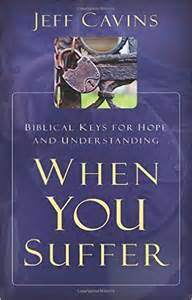 In When You Suffer: Biblical Keys for Hope and Understanding, Jeff Cavins tackles the difficult question of why a good God allows us to suffer and what we can do to make that suffering have value in our lives. He defines suffering as anything that makes our life less than ideal, so this can include life’s minor inconveniences as well as the heavy-duty suffering that can come with physical, mental, or emotional pain.
In When You Suffer: Biblical Keys for Hope and Understanding, Jeff Cavins tackles the difficult question of why a good God allows us to suffer and what we can do to make that suffering have value in our lives. He defines suffering as anything that makes our life less than ideal, so this can include life’s minor inconveniences as well as the heavy-duty suffering that can come with physical, mental, or emotional pain.
Cavins separates suffering into two categories: physical and moral. Physical is temporal, of this earth. It is temporary. Moral, on the other hand, can have eternal consequences and lead to the loss of eternal life. He also states that there are different purposes for suffering. Punitive is suffering as the result of sin. In a statement that many people today would be uncomfortable with, he maintains that God does punish us, but He does it for our good. However, not all suffering is punishment for sin. Some suffering is probative, or a testing of our faith. Other suffering is disciplinary, in which God is trying to educate us, once again for our benefit.
Cavins also calls into question our modern understanding of what it means for God to be good. The ancient Greeks believed that to be happy was to be good. Whereas we tend to equate “happiness with feeling good.” Cavins quotes Peter Kreeft who states, “By ancient standards, God might be good even though he lets us suffer, if he does it for the sake of the greater end of happiness, perfection of life and character and soul, that is, self.”
Is there meaning in our suffering? Cavins’ unequivocal answer is yes, provided that our “suffering is joined with the suffering of Christ.” Anyone raised Catholic has probably been told to “offer it up” when complaining about one thing or another. Here is where that comes in. We are called to share in Christ’s suffering. St. John Paul II maintained that “nothing was lacking in Christ’s suffering, but so that we might know the love of God more deeply, Christ has made room in the suffering for us to participate in it.” But this doesn’t happen by default. We have to will our sufferings to be united with His.
Cavins also discusses some practical ideas for how to cope when you are suffering. He states that “suffering gives you the opportunity to grow . . . [into] a holier person, a more patient person, a person who endures, a person who is kinder, a person who is more merciful. All of this is the fruit of suffering in your life.” That doesn’t necessarily make it easier to accept. For that reason, Cavins offers a list of “Ten Things to Do When You Suffer,” which includes such items as entrusting yourself to God, going to Confession, praying the Rosary, and keeping an eternal perspective.
Cavins has tackled the subject of suffering well. The question of why we suffer has always plagued humanity and will no doubt continue to do so. When one is in pain, no glib answers will suffice. One subject Cavins doesn’t touch on is why young babies and children have to suffer, which is even more difficult to accept than adult suffering. Still, for someone who wants to learn more about a theology of suffering or who is struggling to find meaning and value in a pain-filled existence, When You Suffer may offer the answers that they need.
Buy this book through our Amazon link and support CatholicMom.com with your purchase!
Be sure to check out our Book Notes archive.
Copyright 2016 Patrice Fagnant-MacArthur
AMAZON
http://www.amazon.com/o/ASIN/1616368705/catholicmom
About the Author

Patrice Fagnant-MacArthur
Patrice Fagnant-MacArthur has a master’s degree in applied theology and is the author of The Power of Forgiveness, Our Lady of La Salette: A Mother Weeps for Her Children, and The Life and Lessons of St. Zelie Martin. A mother of three, she is the editor of TodaysCatholicHomeschooling.com as well as a freelance writer and editor.


.png?width=1806&height=731&name=CatholicMom_hcfm_logo1_pos_871c_2728c%20(002).png)
Comments